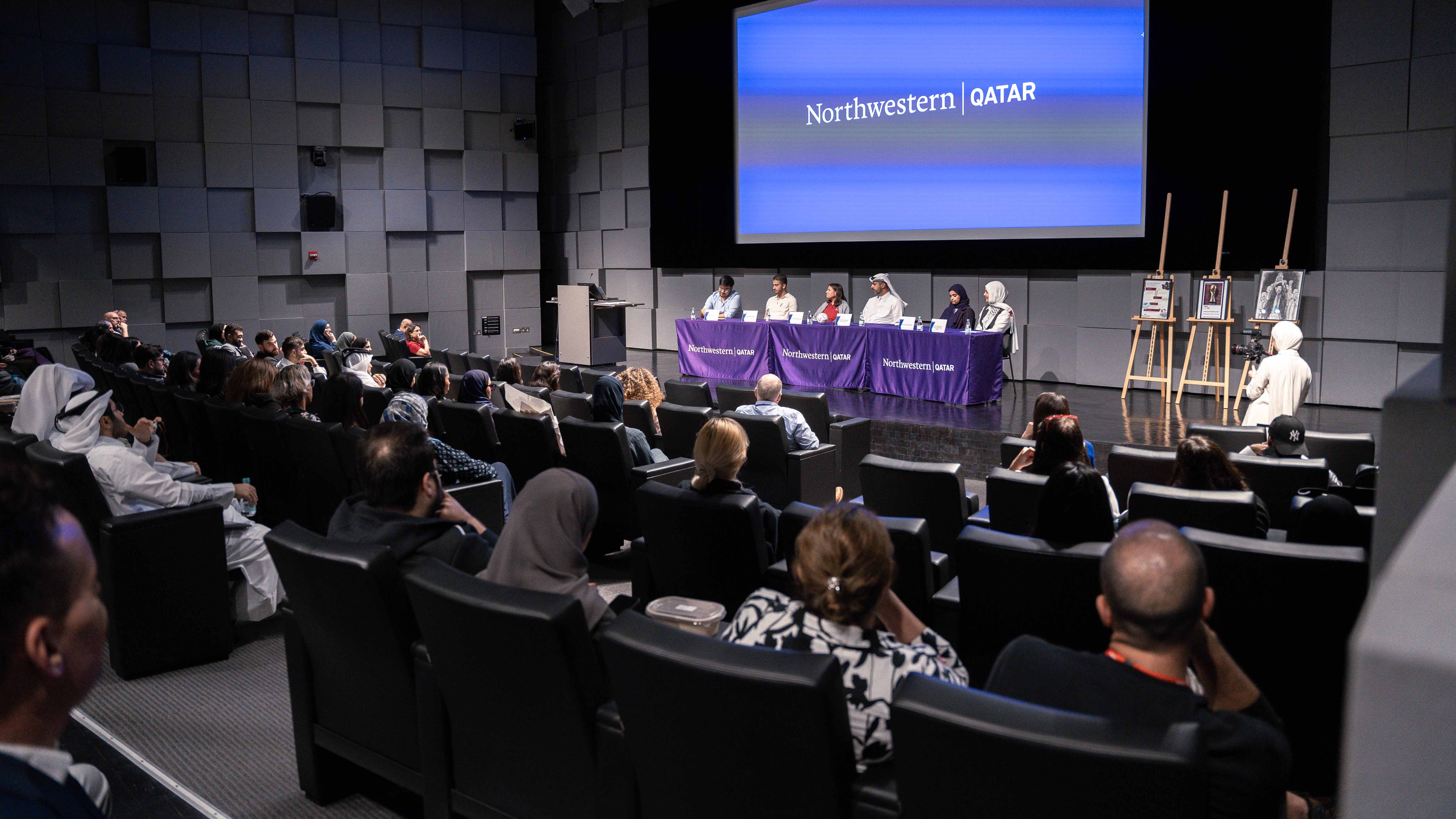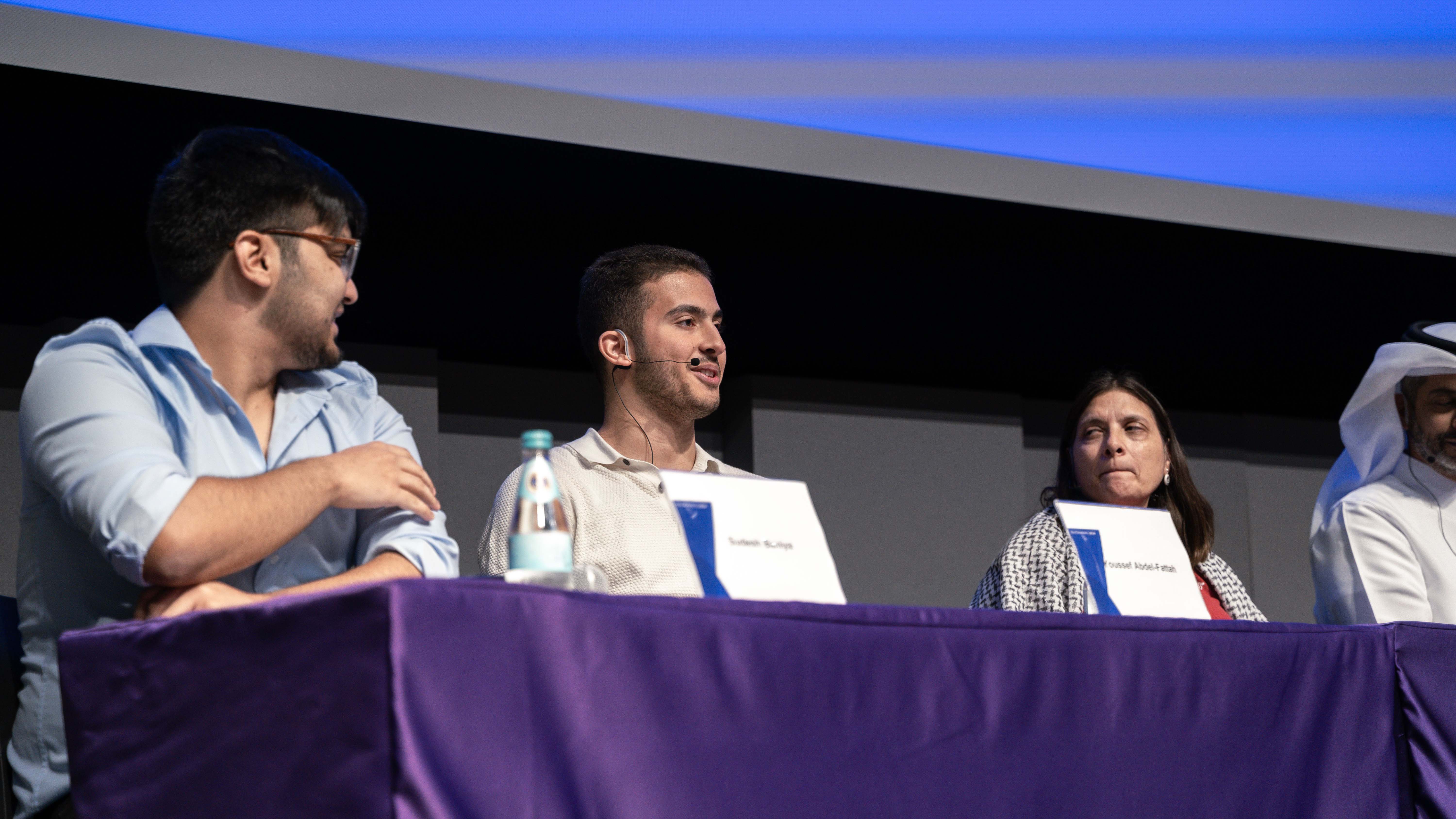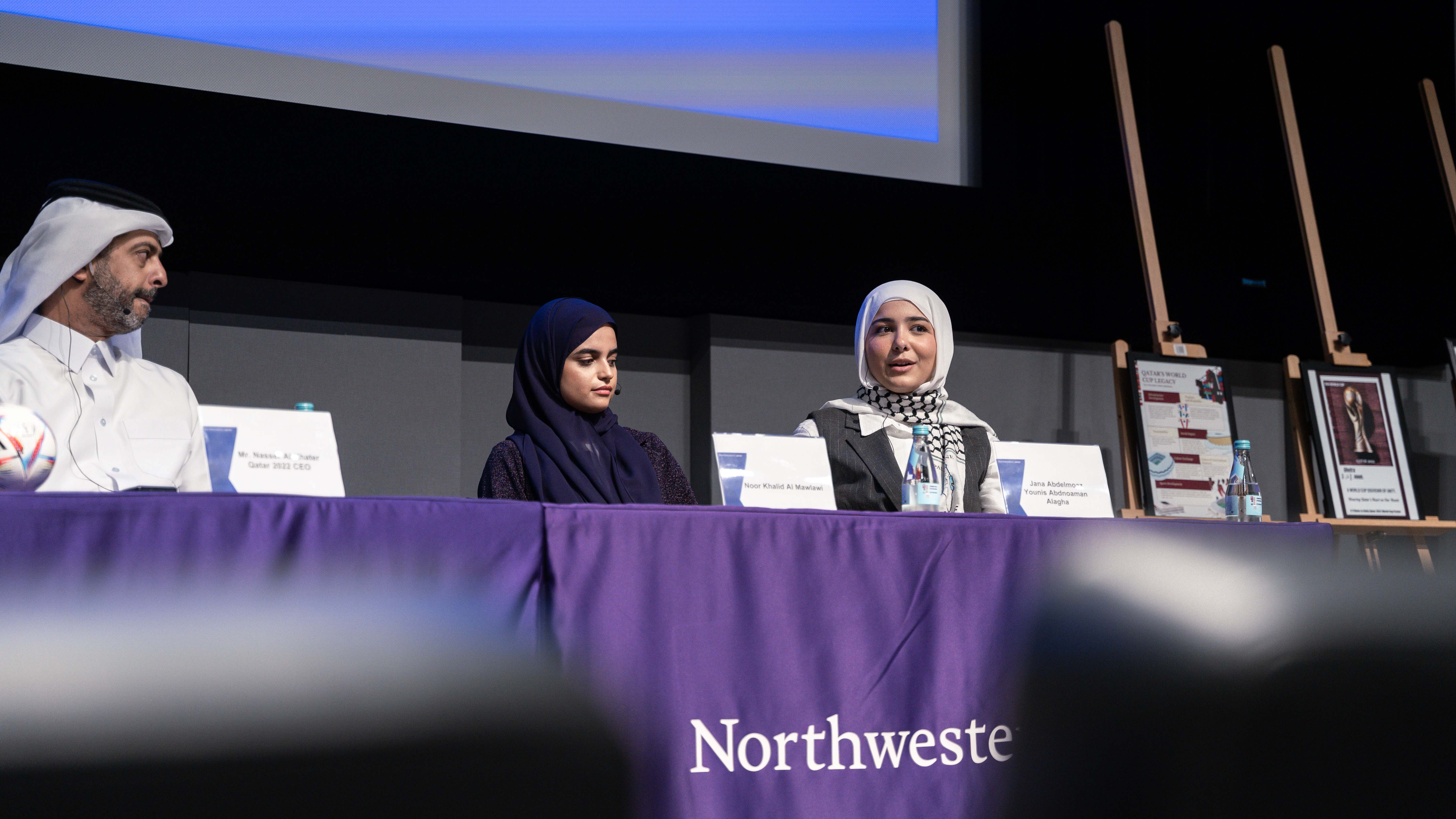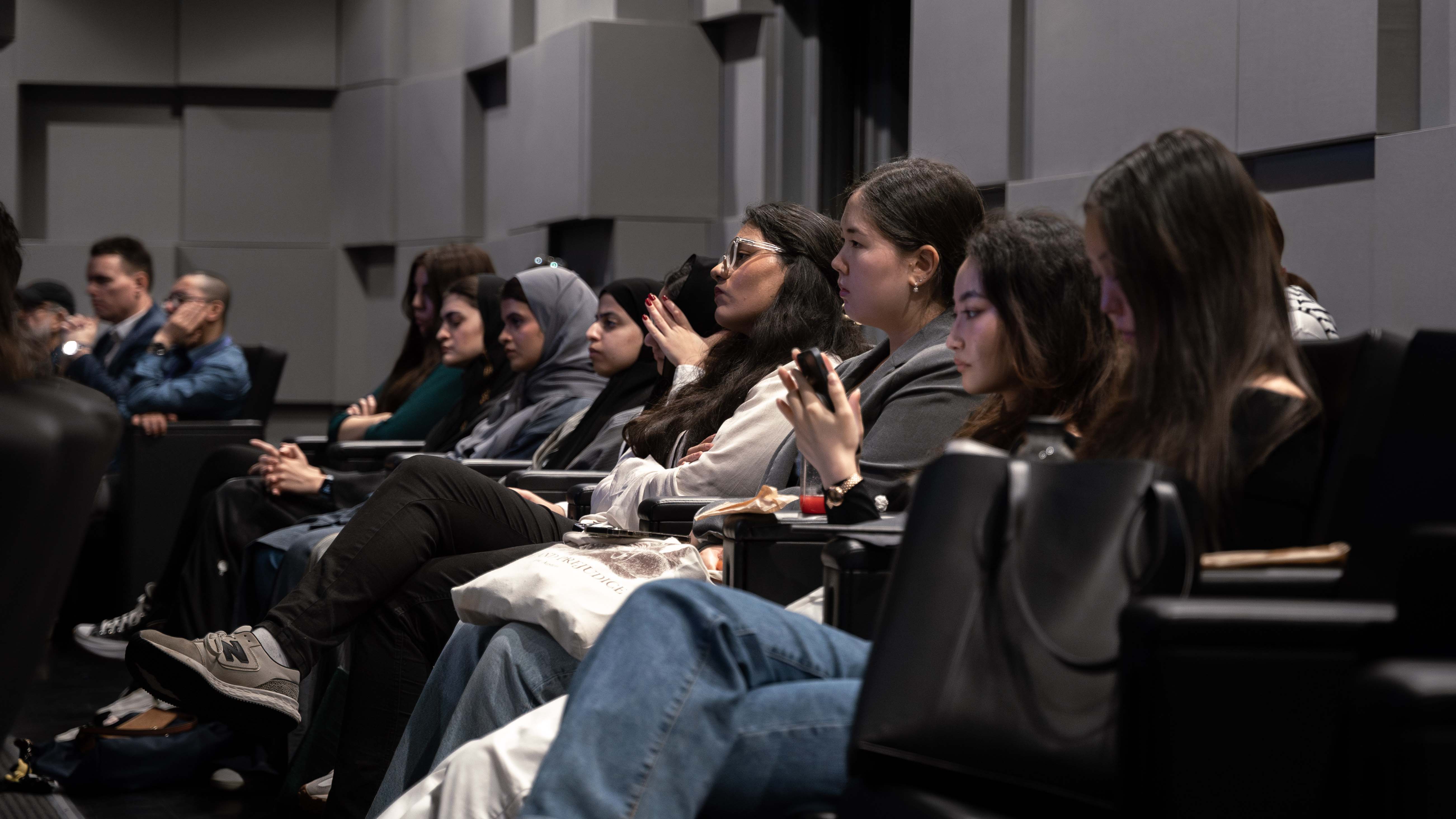A year after the final whistle of the 2022 FIFA World Cup in Qatar, a Northwestern Qatar panel including Nasser Al Khater, CEO of FIFA World Cup Qatar 2022 LLC, examined the social, cultural, and economic legacies of the first tournament of its kind in the region.
The panel, hosted by the Journalism and Strategic Communication Program, featured Al Khater, Hamad Bin Khalifa University (HBKU) Professor Kamilla Swart-Arries, and Northwestern Qatar students Noor Al-Mawlawi, Jana Alagha, and Yousef Abdel-Fattah as speakers. Together, they reflected on the tournament and its impacts on the Qatari society, young generations, media, and the future trajectory of sports in the country and the region in a conversation moderated by Northwestern Qatar student and The Daily Q Editor-in-Chief Sudesh Baniya.
Al Khater began by examining the various legacies of the World Cup and Qatar’s early focus on aligning the World Cup infrastructure projects within the context of national development strategies.“If we are going to talk about the physical infrastructure, we were fortunate that we learned from South Africa and Brazil,” said Al Khater. “We knew that the legacy of these structures was going to be an important subject that we have to tackle, that’s why we started talking about the concept of demountable stadiums and thinking about uses for stadiums after the World Cup, even it was not going to be football.”
As part of its focus on legacy, Al Khater explained how Qatar prioritized using the World Cup as an opportunity to accelerate overall development in the country. “If we go back to 2009 and 2010, the metro project was put on hold indefinitely, and then when we won the World Cup [bid], a decision was taken that we needed to continue with the metro project and we needed to accelerate it,” said Al-Khater. “Also, as part of the 2030 Qatar National Vision, there was also a national masterplan, but that was only to be ready by 2030, but again, we saw that it had to be accelerated for the World Cup, and we see we now have a state-of-the-art road network.”
While the tournament has contributed to the country’s development, Al Khater also stressed the impact the World Cup had in accelerating labor reforms, saying, “If we look at the legacy of workers’ welfare and all the changes and amendments to legislation, we see Qatar has become a trailblazer in the region when it comes to reform, setting up a blueprint that many countries in the region can use.” He added, “It's important in terms of legacy that we continue to develop and continue to leverage those gains made.”
He went on to highlight the football development legacy and how the World Cup has contributed to Qatar’s football growth in the years leading to the tournament. “We saw the Qatar national team’s ranking improve to 42 prior to the World Cup when three or four years before that, it was ranked 101,” said Al Khater. “So, that development is unheard of, and we hope that Qatar can stay within the 42 and 52 because that then means that the legacy of the World Cup on the development of football has been successful.”
In examining Qatar and South Africa’s experiences with hosting the World Cup, Swart-Arries, associate professor at Hamad Bin Khalifa University, said the tournament helped change the way these countries are viewed as a major legacy. “I can’t talk about the 2022 World Cup without reflecting on South Africa’s experience because how Qatar was perceived with all the negativity and pessimism was very much like South Africa,” she stressed. “It is very critical to see how the Western world, in particular, changed its perceptions on how it viewed Qatar, and that is one of the beauties of what we experienced in 2010 and again experienced in 2022.”
The panel, hosted by the Journalism and Strategic Communication Program, featured Al Khater, Hamad Bin Khalifa University (HBKU) Professor Kamilla Swart-Arries, and Northwestern Qatar students Noor Al-Mawlawi, Jana Alagha, and Yousef Abdel-Fattah as speakers. Together, they reflected on the tournament and its impacts on the Qatari society, young generations, media, and the future trajectory of sports in the country and the region in a conversation moderated by Northwestern Qatar student and The Daily Q Editor-in-Chief Sudesh Baniya.
Al Khater began by examining the various legacies of the World Cup and Qatar’s early focus on aligning the World Cup infrastructure projects within the context of national development strategies.“If we are going to talk about the physical infrastructure, we were fortunate that we learned from South Africa and Brazil,” said Al Khater. “We knew that the legacy of these structures was going to be an important subject that we have to tackle, that’s why we started talking about the concept of demountable stadiums and thinking about uses for stadiums after the World Cup, even it was not going to be football.”
As part of its focus on legacy, Al Khater explained how Qatar prioritized using the World Cup as an opportunity to accelerate overall development in the country. “If we go back to 2009 and 2010, the metro project was put on hold indefinitely, and then when we won the World Cup [bid], a decision was taken that we needed to continue with the metro project and we needed to accelerate it,” said Al-Khater. “Also, as part of the 2030 Qatar National Vision, there was also a national masterplan, but that was only to be ready by 2030, but again, we saw that it had to be accelerated for the World Cup, and we see we now have a state-of-the-art road network.”
While the tournament has contributed to the country’s development, Al Khater also stressed the impact the World Cup had in accelerating labor reforms, saying, “If we look at the legacy of workers’ welfare and all the changes and amendments to legislation, we see Qatar has become a trailblazer in the region when it comes to reform, setting up a blueprint that many countries in the region can use.” He added, “It's important in terms of legacy that we continue to develop and continue to leverage those gains made.”
He went on to highlight the football development legacy and how the World Cup has contributed to Qatar’s football growth in the years leading to the tournament. “We saw the Qatar national team’s ranking improve to 42 prior to the World Cup when three or four years before that, it was ranked 101,” said Al Khater. “So, that development is unheard of, and we hope that Qatar can stay within the 42 and 52 because that then means that the legacy of the World Cup on the development of football has been successful.”
In examining Qatar and South Africa’s experiences with hosting the World Cup, Swart-Arries, associate professor at Hamad Bin Khalifa University, said the tournament helped change the way these countries are viewed as a major legacy. “I can’t talk about the 2022 World Cup without reflecting on South Africa’s experience because how Qatar was perceived with all the negativity and pessimism was very much like South Africa,” she stressed. “It is very critical to see how the Western world, in particular, changed its perceptions on how it viewed Qatar, and that is one of the beauties of what we experienced in 2010 and again experienced in 2022.”
Similarly, Alagha, who examined the cultural legacies of the World Cup in Qatar, said the tournament helped facilitate a culture of exchange with a region that has historically been ignored in Western media. “A lot of people [before the tournament] had their doubts and were scared to come here because they were used to seeing on social media and what mainstream media said about Qatar, but when they came here, they saw how welcoming and friendly the people were,” said Alagha. “So, in that case, the cultural legacy was very important because it opened new doors for other world cups to be hosted in the Arab region in general, and at the same time, it was a way for foreigners and visitors to interconnect with the Qatari culture and traditions and get exposed to our values, like modesty, for example.”
For Abdel-Fattah, another positive impact of the World Cup is building more attraction for the domestic league and increasing competition for local players. “Many of the players who actually came to the World Cup made the decision to come to Qatar after the tournament to play in the domestic league,” said Abedl-Fattah. He went on to explain how the tournament infrastructure is also helping the domestic league with increased fan attendance, noting, “We saw a couple of months ago a new record attendance for a league match at Ahmad Bin Ali Stadium, one of the World Cup stadiums that are being used with all of its world-class facilities for domestic league matches and training.”
When asked about Palestinian solidarity and the World Cup, Al Khater said the tournament and fans helped bring the Palestinian cause to the forefront, noting, “The Palestinian cause is very much alive; we saw it in the stadiums. In every match played, you would see somebody or several people carrying the Palestinian flag.” Similarly, Alagha recounted how the tournament allowed for a bigger exposure to the Palestinian cause. “People were asking me, ‘Oh, why are they [fans] holding the Palestinian flags? They are not even part of the World Cup!’ And I had to explain to them that they chose this as a platform to raise awareness, and I also took it as a chance to teach them about Palestinian history and the Palestinian cause.”
Al-Mawlawi reflected on her volunteering work during the World Cup to examine the event’s impact on her personal and professional growth and the ways it has empowered her as a Qatari youth. “Nothing could compare to the lessons I learned in my work during the Working Cup, that hard work and dedication could take you so far,” said Al-Malawi. “This whole experience allowed me to take what we learned in class, day in and out, and see the real-life applications within the work that we do, which motivates me not only to focus harder in class but also to dream big for the aspiration that I have for the future.”
For Abdel-Fattah, another positive impact of the World Cup is building more attraction for the domestic league and increasing competition for local players. “Many of the players who actually came to the World Cup made the decision to come to Qatar after the tournament to play in the domestic league,” said Abedl-Fattah. He went on to explain how the tournament infrastructure is also helping the domestic league with increased fan attendance, noting, “We saw a couple of months ago a new record attendance for a league match at Ahmad Bin Ali Stadium, one of the World Cup stadiums that are being used with all of its world-class facilities for domestic league matches and training.”
When asked about Palestinian solidarity and the World Cup, Al Khater said the tournament and fans helped bring the Palestinian cause to the forefront, noting, “The Palestinian cause is very much alive; we saw it in the stadiums. In every match played, you would see somebody or several people carrying the Palestinian flag.” Similarly, Alagha recounted how the tournament allowed for a bigger exposure to the Palestinian cause. “People were asking me, ‘Oh, why are they [fans] holding the Palestinian flags? They are not even part of the World Cup!’ And I had to explain to them that they chose this as a platform to raise awareness, and I also took it as a chance to teach them about Palestinian history and the Palestinian cause.”
Al-Mawlawi reflected on her volunteering work during the World Cup to examine the event’s impact on her personal and professional growth and the ways it has empowered her as a Qatari youth. “Nothing could compare to the lessons I learned in my work during the Working Cup, that hard work and dedication could take you so far,” said Al-Malawi. “This whole experience allowed me to take what we learned in class, day in and out, and see the real-life applications within the work that we do, which motivates me not only to focus harder in class but also to dream big for the aspiration that I have for the future.”




